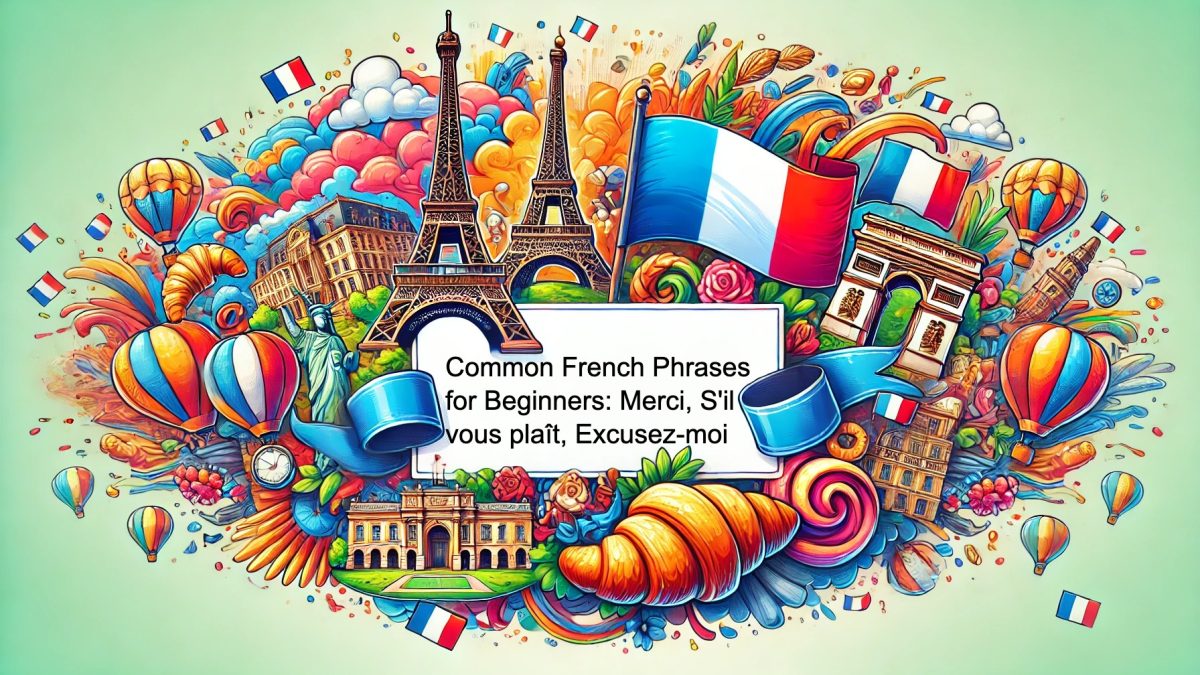Common French Phrases for Beginners: Merci, S’il vous plaît, Excusez-moi

Telling Time in French (L’Heure)
August 11, 2024
Expressing Likes and Dislikes in French
August 11, 2024Common French Phrases for Beginners: Merci, S’il vous plaît, Excusez-moi
When learning French at the A1 level, mastering common phrases is essential for effective communication. Three of the most fundamental expressions are “Merci” (Thank you), “S’il vous plaît” (Please), and “Excusez-moi” (Excuse me). These phrases are used daily in French-speaking environments, and understanding their proper usage is crucial for polite and respectful interactions. This comprehensive guide will explore these phrases in detail, provide numerous examples, and offer tips on how to use them in various contexts.
1. Merci (Thank You)
“Merci” is one of the most basic yet powerful words in French. It expresses gratitude and appreciation, making it an essential phrase for any French learner.
Basic Usage:
- Merci: The simplest form, meaning “Thank you.”
- Example: Merci pour votre aide. (Thank you for your help.)
- Merci beaucoup: A stronger form, meaning “Thank you very much” or “Thanks a lot.”
- Example: Merci beaucoup pour le cadeau. (Thank you very much for the gift.)
- Merci bien: Another way to say “Thank you very much,” though slightly less common than “Merci beaucoup.”
- Example: Merci bien pour votre temps. (Thank you very much for your time.)
Expressions Involving “Merci”:
- Merci d’avance: “Thank you in advance.” This is used when you are thanking someone for something they will do in the future.
- Example: Merci d’avance pour votre réponse. (Thank you in advance for your response.)
- Je vous remercie: A more formal way to say “I thank you.”
- Example: Je vous remercie de m’avoir invité. (I thank you for inviting me.)
- Merci de + [infinitive verb]: Used to thank someone for a specific action.
- Example: Merci de m’aider. (Thank you for helping me.)
Cultural Note:
In French culture, expressing gratitude is important. Saying “merci” after receiving a service, gift, or compliment is expected and considered polite. Not thanking someone can be perceived as rude or ungrateful.
Common Situations:
- Receiving a Service:
- At a restaurant: Merci pour le service. (Thank you for the service.)
- At a store: Merci pour votre aide. (Thank you for your help.)
- Receiving a Gift:
- Merci beaucoup pour ce magnifique cadeau. (Thank you very much for this wonderful gift.)
- Expressing General Gratitude:
- Merci pour tout ce que vous avez fait. (Thank you for everything you’ve done.)
2. S’il vous plaît (Please)
“S’il vous plaît” is the standard way to say “please” in French, and it’s used to make requests politely. The phrase literally means “If it pleases you,” which reflects the politeness embedded in French culture.
Basic Usage:
- S’il vous plaît: Used in formal or plural situations.
- Example: Pouvez-vous m’aider, s’il vous plaît? (Can you help me, please?)
- S’il te plaît: The informal version of “please,” used when speaking to friends, family, or anyone you would address as “tu.”
- Example: Passe-moi le sel, s’il te plaît. (Pass me the salt, please.)
Expressions Involving “S’il vous plaît”:
- Pourriez-vous + [verb] + s’il vous plaît?: A very polite way to make a request.
- Example: Pourriez-vous répéter, s’il vous plaît? (Could you repeat, please?)
- Un café, s’il vous plaît: Commonly used when ordering in a café or restaurant.
- Example: Un café, s’il vous plaît. (A coffee, please.)
Cultural Note:
In French-speaking cultures, using “s’il vous plaît” or “s’il te plaît” is considered essential in any request, no matter how small. Forgetting to say “please” can come across as impolite or demanding.
Common Situations:
- Making a Request:
- At a restaurant: Un verre d’eau, s’il vous plaît. (A glass of water, please.)
- Asking for help: Aide-moi, s’il te plaît. (Help me, please.)
- Ordering Something:
- In a café: Un croissant, s’il vous plaît. (A croissant, please.)
- Asking for Permission:
- Puis-je entrer, s’il vous plaît? (May I come in, please?)
3. Excusez-moi (Excuse Me)
“Excusez-moi” is used in French to apologize, get someone’s attention, or ask for something in a polite manner. Understanding when and how to use this phrase correctly is important for navigating social interactions in French.
Basic Usage:
- Excusez-moi: The formal or plural version, used when addressing strangers, in formal situations, or when you need to be particularly polite.
- Example: Excusez-moi, où sont les toilettes? (Excuse me, where is the restroom?)
- Excuse-moi: The informal version, used when speaking to friends or peers.
- Example: Excuse-moi, je suis en retard. (Excuse me, I am late.)
Expressions Involving “Excusez-moi”:
- Excusez-moi de vous déranger: “Excuse me for disturbing you,” used when you need to interrupt someone.
- Example: Excusez-moi de vous déranger, mais j’ai une question. (Excuse me for disturbing you, but I have a question.)
- Excusez-moi, je cherche + [location/object]: Used to politely ask for directions or help finding something.
- Example: Excusez-moi, je cherche la gare. (Excuse me, I’m looking for the train station.)
- Pardon: A more casual way to say “excuse me,” often used when trying to pass through a crowd or after a minor mistake.
- Example: Pardon, je n’ai pas vu que tu étais là. (Sorry, I didn’t see you there.)
Cultural Note:
Using “Excusez-moi” is a sign of respect and politeness. In French culture, it’s important to acknowledge others’ space and time, so using this phrase when interrupting, asking for help, or correcting a mistake is crucial.
Common Situations:
- Asking for Directions:
- Excusez-moi, où est la station de métro la plus proche? (Excuse me, where is the nearest metro station?)
- Interrupting Someone:
- Excusez-moi de vous interrompre, mais j’ai une question. (Excuse me for interrupting, but I have a question.)
- Making a Minor Apology:
- Excusez-moi, je ne voulais pas vous déranger. (Excuse me, I didn’t mean to disturb you.)
Combining Phrases in Daily Conversations
These three phrases—”Merci,” “S’il vous plaît,” and “Excusez-moi”—are often used together in daily interactions to maintain politeness and show respect. Here’s how they might be combined:
- At a Restaurant:
- You: Excusez-moi, un café, s’il vous plaît. (Excuse me, a coffee, please.)
- Waiter: Bien sûr. (Of course.)
- Waiter: Voilà, votre café. (Here is your coffee.)
- You: Merci beaucoup. (Thank you very much.)
- Asking for Directions:
- You: Excusez-moi, où est la bibliothèque, s’il vous plaît? (Excuse me, where is the library, please?)
- Passerby: C’est juste là-bas, à droite. (It’s just over there, on the right.)
- You: Merci bien. (Thank you very much.)
- Making a Request:
- You: Pourriez-vous m’aider, s’il vous plaît? (Could you help me, please?)
- Person: Bien sûr, avec quoi? (Of course, with what?)
- You: Je cherche un bon restaurant. Excusez-moi, je ne connais pas bien la ville. (I’m looking for a good restaurant. Excuse me, I don’t know the city well.)
- Person: Pas de problème, suivez-moi. (No problem, follow me.)
- You: Merci beaucoup! (Thank you very much!)
Practice Exercises
Here are some exercises to help you practice using these phrases correctly:
- Fill in the blanks with the correct phrase:
- , pouvez-vous répéter, ?
- _, je cherche le musée.
- _ de votre aide. Answers:
- Excusez-moi, pouvez-vous répéter, s’il vous plaît?
- Excusez-moi, je cherche le musée.
- Merci de votre aide.
- Translate the following sentences into French:
- Excuse me, can you help me, please?
- Thank you for the gift.
- May I have the bill, please? Answers:
- Excusez-moi, pouvez-vous m’aider, s’il vous plaît?
- Merci pour le cadeau.
- Puis-je avoir l’addition, s’il vous plaît?
- Correct the mistakes in the following sentences:
- Merci bien pour ton aide, s’il te plait.
- Excuse moi, où est le gare?
- Je veux un café, si’il vous plaît. Answers:
- Merci bien pour ton aide, s’il te plaît.
- Excusez-moi, où est la gare?
- Je veux un café, s’il vous plaît.
Conclusion
Mastering common phrases like “Merci,” “S’il vous plaît,” and “Excusez-moi” is essential for beginners learning French. These expressions are the foundation of polite conversation and are used daily in various contexts. By understanding their meanings, proper usage, and how to combine them in conversations, you will enhance your ability to communicate effectively and respectfully in French-speaking environments.
Remember, using these phrases correctly can make a significant difference in how you are perceived by native speakers. So, practice regularly, pay attention to the context, and incorporate these phrases into your daily interactions. Bonne chance (good luck) on your journey to mastering French!
Links:
French Grammar
French Vocabulary

